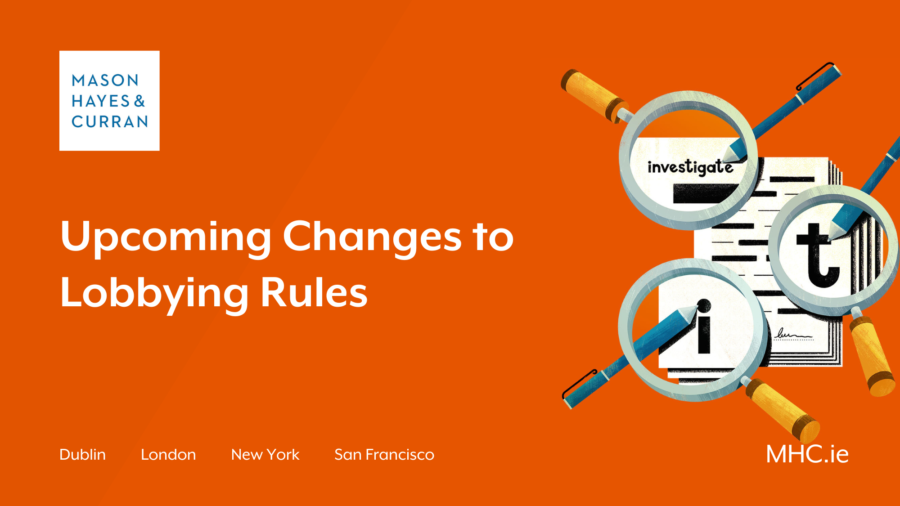Upcoming Changes to Lobbying Rules

Ireland’s lobbying rules are set out in the Regulation of Lobbying Act 2015 (the Act). We previously covered the Act’s requirements for certain bodies that lobby Designated Public Officials (DPOs) to be registered and to file regular returns summarising their lobbying activities.
The Regulation of Lobbying (Amendment) Bill 2022 (the Bill) seeks to broaden the application of the Act by requiring a wider variety of bodies to register and file returns. The Bill proposes to:
- Extend the definition of lobbying itself as it relates to the development and zoning of land
- Enhance provisions which limit the activities of Designated Public Officials (DPOs) once they leave office, and
- Introduce an administrative sanctions regime administered by the Commission on Standards in Public Office (the Commission)
Expanded scope of the Act
The Bill’s Explanatory Memorandum notes that the purpose of the Bill is “build on the existing strong legislative foundation and further strengthen Ireland’s lobbying laws to ensure that regulation of lobbying framework remains up to date and fit for purpose.” This is to be achieved in part by broadening the groups of organisations required to be present on the lobbying register.
Under the current Act, civil society groups which represent their members or pursue particular issues are only subject to the lobbying regime if they have at least one full-time employee. Under the Bill, a body that exists primarily to represent members or take up particular issues may come within the regime even when it has no employees. Informal business groups will be brought within the scope of the Act, particularly bodies formed to represent the interests of their members and bodies that are established mainly to take up specific issues. Such bodies will be brought within the scope of the Act where at least one member of the body would be classified by the Act as carrying out lobbying activities if they were acting solely on their own behalf. The Bill proposes to require all such bodies, when registering, to list the names of all members.
Further, the Bill proposes to broaden the definition of lobbying relating to the development or zoning of land. At present, the Act applies to anyone who “makes any relevant communications” on this matter. The Bill would broaden this category in line with other lobbying matters, to apply not just to a person who makes a relevant communication concerning development or zoning but also anyone who “manages or directs the making of” such a communication.
The Bill seeks to amend the Act to create an offence where a registered body has been indicated on the lobbying register to have ceased carrying out lobbying activities continues to carry out such activities. Committal of such an offence may result in a class C fine on summary conviction, or a fine and/or imprisonment for up to two years on indictment.
Administrative Sanctions
The Bill proposes to implement an administrative sanctions regime for two newly prohibited actions.
Firstly, a person who takes an action intending to avoid or circumvent their registration or filing obligations may be subject to this sanction.
Secondly, the Bill proposes to strengthen restrictions on former DPOs. DPOs are currently limited in their activities for one year after leaving office; they must obtain consent of the Commission to engage in lobbying or become employed by a body that lobbies certain DPOs. The Bill seeks to create a new relevant contravention where a DPO has failed to seek prior consent of the Commission or where that consent is subject to conditions imposed by the Commission, has breached those conditions.
A breach of either of these provisions could result in a
- Minor sanction: advice, caution or reprimand, or
- Major sanction: a fine of up to €25,000 and/or prohibition from lobbying for two years.
The latter category must be confirmed by the Circuit Court.
Conclusion
The Bill was recently approved by Dáíl Éireann and now awaits Seanad scrutiny. Those currently on the lobbying register, as well as those who are not registered but have regular contact with DPOs, should give careful consideration to their position under the proposed new rules.
For more information on lobbying requirements, contact a member of our Public, Regulatory & Investigations team.
The content of this article is provided for information purposes only and does not constitute legal or other advice.
Share this:




